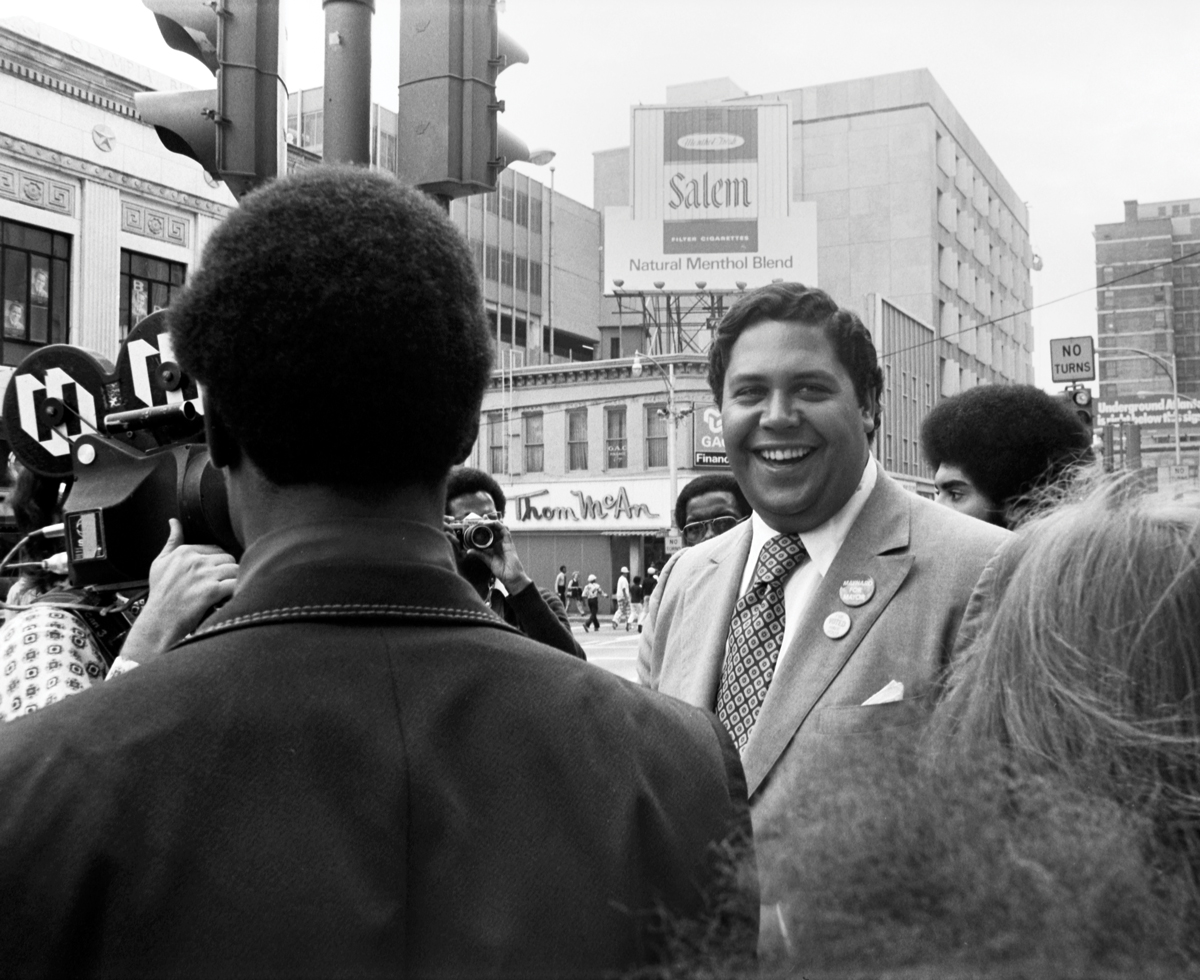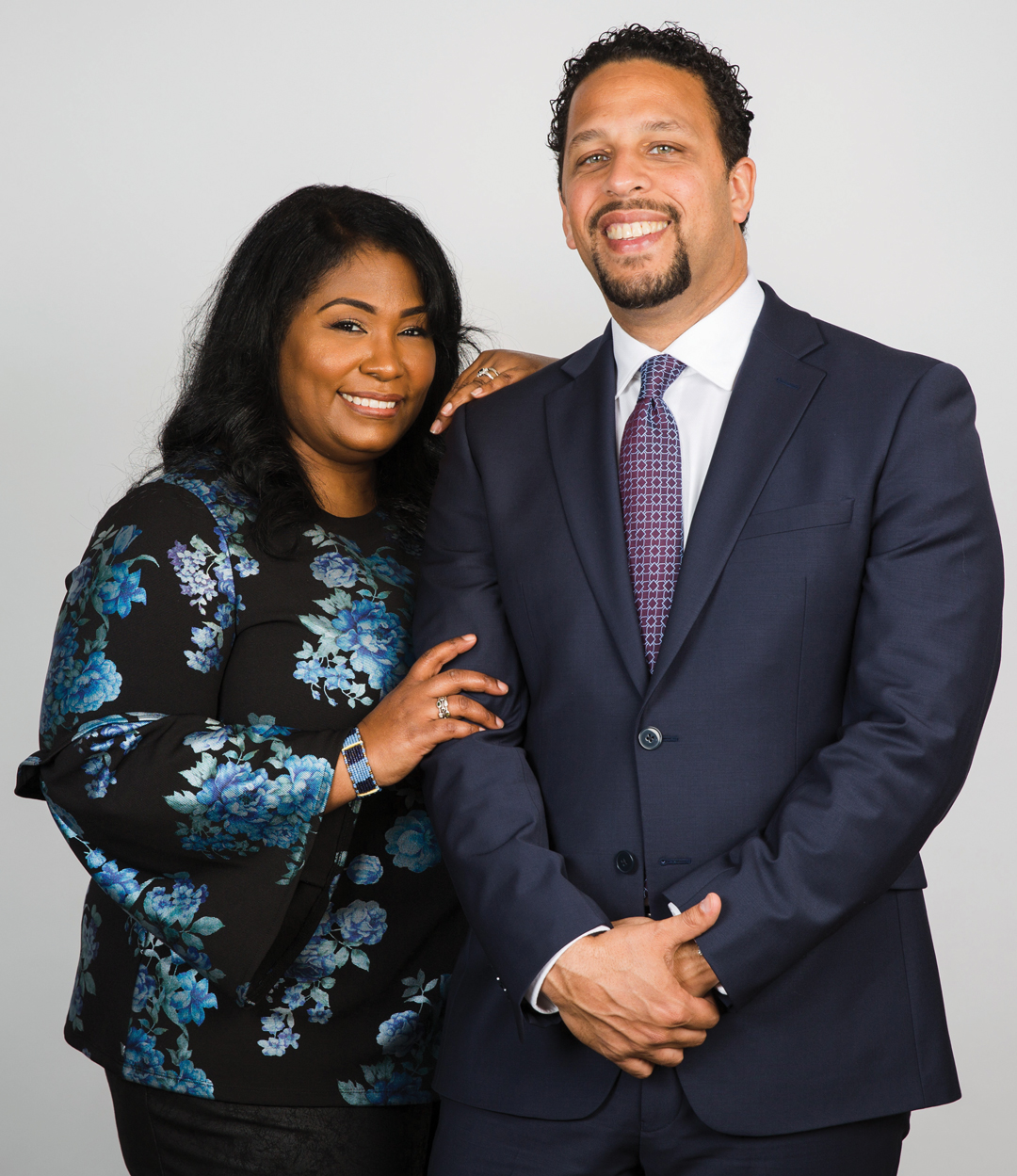
Photograph courtesy of the Kenan Research Center at the Atlanta History Center
One day three years ago, Maynard Jackson III woke up and felt a force compelling him to make a documentary about the life of his father.
Jackson is the only son of Maynard Holbrook Jackson Jr., the 54th (and 56th) mayor of Atlanta, the first person of color to hold that office in the city, the man who not only built the airport as we know it today, but who once said that weeds would grow on the runways before he’d go back on his pledge to include more minority businesses in its construction.
Maynard III inherited much from his father—not just his name, but even his nickname, Buzzy (a label Mayor Jackson’s sisters gave him in youth because of the sound he made when he slept). Maynard III also was born with his father’s sea-green eyes and, most notably, the burden of high expectations. His grandfather, the mayor’s father, was pastor of historic Friendship Baptist Church, and Maynard III’s great-grandfather was John Wesley Dobbs, who brought thousands of black Atlantans onto the voter rolls and whose political clout led to the hiring of Atlanta’s first black police officers.
Mayor Jackson died in 2003 from a heart attack after collapsing at Reagan National Airport in Washington, D.C. He was just 65, and his sudden passing affected his family in different ways. Valerie Jackson, his widow, says that for three entire years after his death, she’d wake up at 5 a.m., remember he was gone, and weep. For Maynard III, his father’s death left things forever unsaid between them that would haunt him. In many ways, in fact, Maynard—which is screening April 14 and April 22 at the Atlanta Film Festival after showings at DOC NYC and the 2018 Pan African Film Festival, among others—is more than just a public history of a public figure, but also an exploration of the toll that a public life can exact on a family.
Bunnie Jackson-Ransom, Mayor Jackson’s first wife, distinctly remembers the tension that her ex-husband’s ambition caused in their marriage. In 1968, the couple traveled to North Carolina to show off their infant daughter to the baby’s grandparents. The future mayor returned to Atlanta early and, without telling his wife, borrowed $3,000 to qualify to run against incumbent Herman Talmadge for a United States Senate seat. The agreement with his wife had been that he’d pursue his law career, but the assassination of Robert Kennedy that year changed everything.
“He called me up and said, ‘This is what I have done’,” Bunnie recalls. “Now mind you, I was on maternity leave. We had just bought a little house. We had no savings. He had no job, and we had a baby. I said, ‘Maynard, how are we going to pay the house note?’ I was so pissed with him.”
Jackson’s Senate campaign ended in defeat, but his showing among Atlanta voters cleared the path to becoming vice mayor under Sam Massell and then, famously, to upsetting Massell in 1973 to become the city’s first black mayor. By then, he and Bunnie had three children—Elizabeth, Maynard III, and Brooke. Bunnie’s mother helped watch the children while their parents worked.
Sometime after his election, Atlanta’s newest mayor was featured in the pages of Ebony magazine. Several hundred miles away, a young woman just out of the Wharton School saw the spread and thought to herself, “Man, I want me a Maynard Jackson.” Her name was Valerie Richardson, and she would, as fate would have it, be set up with Jackson not long after his divorce from Bunnie. They would marry in 1977, and their union would produce Mayor Jackson’s third and fourth daughters, Valerie-Amanda and Alexandra.

Photograph by Kevin D. Liles
Maynard III, meanwhile, grew up navigating an age-old tension between the path he saw for himself and the one his father imagined for him. At five, he took up the drums, and, as he grew older, he’d practice as many as eight hours a day. “I wasn’t on the path to becoming a lawyer or a doctor,” Maynard III says now. But he felt the pressures, nonetheless. “I wasn’t oblivious to what was going on, to the line of succession. But my life was taking another turn.” He and his wife, Wendy Eley Jackson, are cofounders of Auburn Avenue Films. Between them, they have four children.
In the 1990s, writer Gary Pomerantz spent hours interviewing Mayor Jackson for what would become Where Peachtree Meets Sweet Auburn, an exhaustively researched book that tells the history of Atlanta through two families—Jackson’s and that of Ivan Allen, the city’s penultimate white mayor. The audio recordings of those discussions, stored at Emory University, would inform much of Maynard, and it was from those tapes that Maynard III heard, for the first time, that his father regretted not spending more time with his son. Except the mayor never told him that directly. Says Maynard III: “He could have just said, ‘Hey Buzz, let’s go fishing or something.’ I would have been very receptive to that. It was just perplexing that he was so frustrated about that but didn’t come to me.”
Such complicated realities are essential components of any comprehensive documentary, which is why the family turned to Sam Pollard to direct it. Pollard had edited Spike Lee’s movies and directed numerous documentaries, including Slavery by Another Name. Before he signed on to direct Maynard, Pollard insisted on creative control. “I didn’t want to do a hagiography,” he says. It was essential to Pollard, for instance, that he interview not just family members but also the mother of one of the victims of the Atlanta Child Murders of 1979–1981, for which Wayne Williams was ultimately held responsible. It would be hard to overstate the fear the murders instilled in black Atlanta during those days, or how it vexed the administration of Mayor Jackson, who ordered extra protection for his own children. Maynard III remembers ditching the security detail on more than one occasion to escape on his bike to a friend’s house.

Photograph by Jason Glasgow
Production on Maynard took more than two years. Wendy Eley Jackson is a veteran of the film and TV industry and one of the executive producers. The challenge, as she and everyone involved in the project encountered, was keeping the documentary to a digestible length. “There are 7,280 hours of research in this,” she says. “We interviewed 43 people, but less than half of that made the documentary.” Among those in the final cut are Al Sharpton, Bill Clinton, Kasim Reed, Andrew Young, historian Maurice Hobson, as well as Bunnie, Valerie, and all five of Mayor Jackson’s children.
For the past 18 years, Valerie has hosted a talk show on WABE. Not long ago, one of her guests on Valerie Jackson in Conversation was the stage director Kenny Leon, who recalled Mayor Jackson talking about what he called “Scared Negro Disease.” “Black people who get into positions of power, they’re sometimes afraid to use that power to help others, because they don’t want to rock the boat,” Valerie says. “Kenny Leon said that when he heard those words from Maynard, he made it a point to never be afraid to use his power and position.”
Valerie, whose dining room table became covered with ephemera and mementos during the making of Maynard, says that her husband took great satisfaction in the work of the Maynard Jackson Youth Foundation Leadership Academy, which for more than 20 years has taught leadership skills to area high school students. In his later years, he’d meet with each Leadership class twice a month, guiding them, charming them, prodding them. The program continues today and has earned its students millions of dollars in scholarships. Valerie calls it her husband’s “most personal and precious accomplishment.”
It’s now been 15 years since Maynard Jackson’s death, but the issues the documentary explores—the city’s fraught racial history, the expectations placed on a black mayor, the scrutiny on minority contracts for city business—feel very relevant today. For Maynard III, though, the film’s goal is simpler: “He was the kind of guy I wish everybody got a chance to meet. He was able to touch you in a way that gives you hope.”
See the film: Maynard will play twice during the 42nd annual Atlanta Film Festival. The first screening is April 14 at 7 p.m. at the Plaza Theatre. The second screening is April 22 at 6 p.m. at the Rialto Center for the Arts. More information about the festival can be found here.
This article appears in our April 2018 issue.















